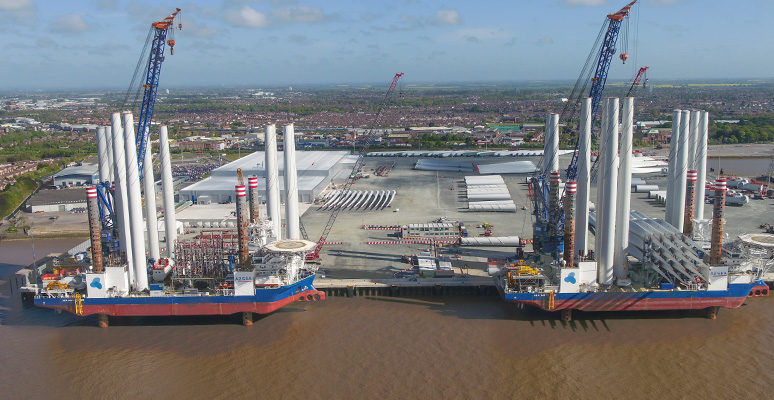
An economic impact study shows Green Port Hull has created more than 2,000 jobs in the renewable energy sector and its supply chain, providing a significant boost to the economy.
Green Port Hull is a partnership established to promote the region and attract renewable energy sector investment.
As a partner, the University of Hull’s Logistics Institute has undertaken an economic, social and environmental impact assessment of the renewable energy sector since the significant investment made in Hull by Siemens Gamesa and Associated British Ports (ABP).
In March 2014 Siemens Gamesa and ABP announced an investment of £310 million in the development of an offshore wind turbine blade manufacturing facility on Alexandra Dock in Hull.
Today, two years into the three year study, preliminary evidence from the impact assessment have been made public as part of a new Green Port Impact Assessment website.
These include:
Multiplier effect: 1.47
- The economic impact of the initial Siemens Gamesa and ABP investment is substantially greater than their investment. For every £1 of investment, an additional 47 pence will be generated in the disposable income of the local economy of the Humber[1].
Employment
- Direct Employment creation (Siemens Gamesa): 1,063 jobs created for the plant with potential for an additional 627 supporting jobs based on the latest employment multiplier data for the UK manufacturing sector[2]
Gross Value Added (GVA)[3]
- Direct employment by Siemens Gamesa may contribute up to £71.3m to the GVA of Hull[4]
- 76 long term unemployed people securing sustainable employment in related industries, the majority of which are in the Caravan industry, which translates to an additional 75 supporting jobs based on current industry statistics
- Reduction in benefits – The creation of 76 sustainable employment opportunities has resulted in benefits saved between £228,820 and £288,891.
Amar Ramudhin, Director of the Logistics Institute at the University of Hull, said: “This impact assessment is an important part of Green Port Hull, offering a valuable insight into how the project is progressing. Our research will inform the next steps for the project as the region drives to become a world-leading centre for renewables.
“We are also launching today a new Impact Assessment website where people will be able to get a flavour of the developments of key evidence, as well as get an appreciation of the impact Green Port Hull, and Siemens Gamesa in particular, has had on the region.”
Mr Thompson introduced a report detailing the history of the Siemens Gamesa and ABP investment.
He said: “The goal of this report is to inform and educate policy makers and local stakeholders as to the barriers that existed along the way, and the ways in which they were overcome, so that future inward investments in the offshore sector can be facilitated and supported effectively.
“What the report shows is, despite the challenges, the Hull and the Humber region is on track to become one of the UK’s leading clusters within the sector and with offshore wind set to form an important part of our nation’s electricity system going forward, there is great potential for more supply chain opportunities and further growth.”
Councillor Martin Mancey, Portfolio Holder for economic investment, regeneration and planning said: “Green Port Hull and the Siemens Gamesa investment have been a game changer for the region. I’m delighted that the University’s impact assessment has detailed the many benefits the area has reaped from Green Port Hull and the growing green energy sector.
“The city’s economy is on an upward curve and in the last year Hull registered the strongest growth rate in the country, 43 per cent ahead of the UK as a whole. Unemployment is at its lowest on record and Green Port Hull, alongside being the UK City of Culture, have been the major influences on these positive trends. Investments from the private sector such as RB and Smith and Nephew have also contributed to changing the fortune of the city dramatically. “The Council will continue to work with partners to establish Hull and the East Riding of Yorkshire and the Humber region as a world class centre for renewable energy, creating wealth and employment for the region.”
Visit the Green Port Impact Assessment website to view further findings.
For more information about the University of Hull, see www.hull.ac.uk.
